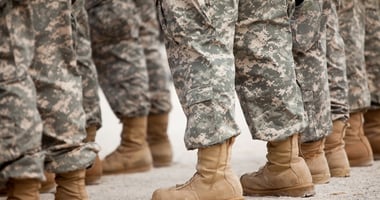Past-month use of e-cigarettes among high schoolers skyrocketed nearly 80% since 2017, and among...
Deployment, not Military Service, Stresses Reservists
Deployment appears to lead to greater stress and suicidality risk among U.S. military reservists than among active-duty troops, according to a study in the June American Journal of Public Health. "
Deployment...represents unique threats to all service members’ mental well-being,” wrote Marian Lane, Ph.D., of the Substance Abuse, Epidemiology, and Military Behavioral Health Program of RTI International.
Lane and colleagues collected data from 18,342 reservists and 16,146 active-duty personnel for their study.
After adjustment for potentially confounding factors, reservists reported similar or less work and family stress, depression, and anxiety symptoms than did active-duty personnel. However, reservists who had been deployed reported higher rates of suicidality than deployed active-duty personnel and higher rates of posttraumatic stress disorder symptoms than active-duty personnel and reservists who had not been deployed.
Click here to read coverage of military mental health issues in Psychiatric News. To read the latest information on posttraumatic stress disorder, including among military personnel, see The Clinical Manual for Management of PTSD
from American Psychiatric Publishing.
After adjustment for potentially confounding factors, reservists reported similar or less work and family stress, depression, and anxiety symptoms than did active-duty personnel. However, reservists who had been deployed reported higher rates of suicidality than deployed active-duty personnel and higher rates of posttraumatic stress disorder symptoms than active-duty personnel and reservists who had not been deployed.
(Image: Oleg Zabielin/Shutterstock.com)






